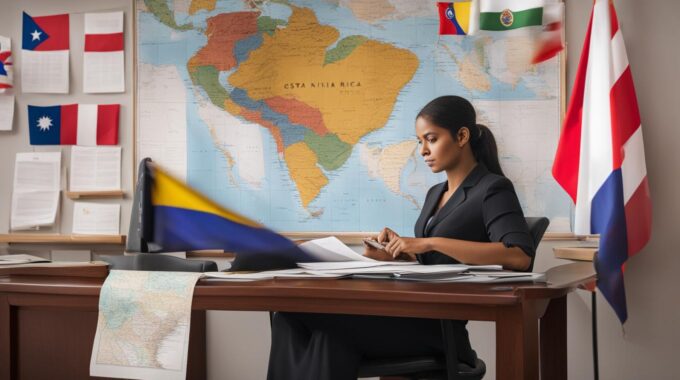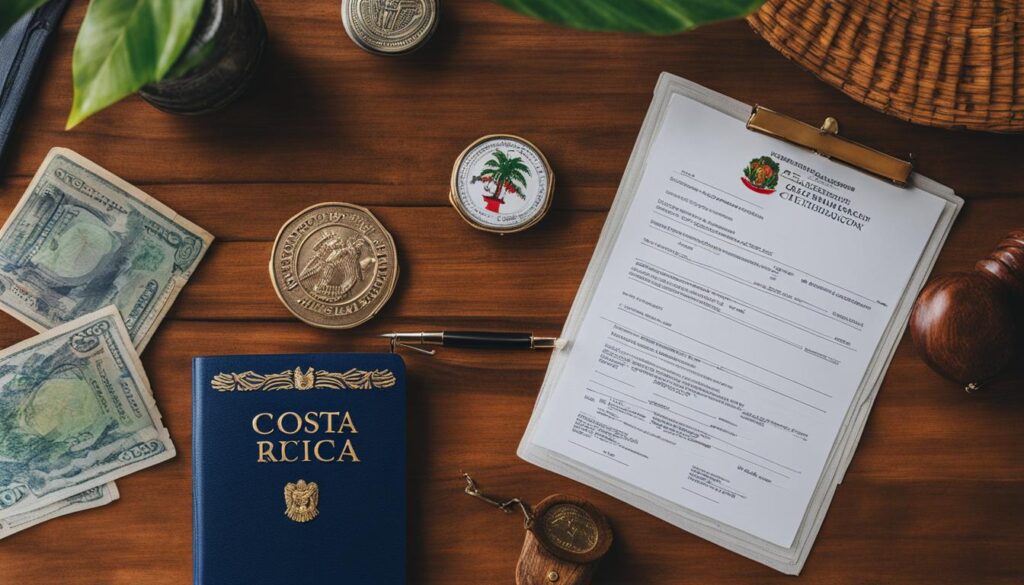At the forefront of property financing in Costa Rica, GapInvestments.com stands as a beacon for…

Understanding the Naturalization Process in Costa Rica
Costa Rica, known for its stunning landscapes and welcoming culture, offers foreigners the opportunity to become citizens through the naturalization process. Whether you are married to a Costa Rican citizen or have resided in the country for an extended period, this article will guide you through the various pathways to Costa Rican citizenship.
Obtaining Costa Rican citizenship through marriage is one of the pathways available. To qualify, you must have been married to a Costa Rican citizen for at least two years and have resided in the country for the same duration after the marriage. It’s important to note that any time spent living abroad will be deducted from the required in-country time.
To apply for citizenship through marriage, you will need to gather several documents, including a cover letter, background check, birth certificate, passport-size photographs, a certified copy of your passport, your Costa Rican spouse’s ID, and your marriage certificate. Additionally, any foreign documents must be authenticated and translated into Spanish.
In addition to marriage, there are alternative pathways to Costa Rican citizenship. For instance, Law Number 1916 allows children of foreign parents born in Costa Rica to apply for citizenship. This requires the child to be born in Costa Rica and have parents of foreign nationality.
Understanding the requirements and documentation needed for each pathway is crucial. It’s advisable to consult with immigration experts who can guide you through the naturalization process, ensuring a smooth and efficient application.
Key Takeaways:
- The naturalization process in Costa Rica offers various pathways to citizenship, including through marriage and specific laws addressing children of foreign parents.
- Requirements for citizenship through marriage include being married to a Costa Rican citizen for at least two years and residing in the country for the same duration.
- Certain documents, such as a cover letter, background check, and birth certificate, are required for citizenship applications.
- Foreign documents must be authenticated and translated into Spanish for submission.
- Consulting with immigration experts can help navigate the process smoothly and efficiently.
Different Pathways to Costa Rican Citizenship
Costa Rica offers various pathways for individuals to obtain citizenship through naturalization. These pathways cater to different circumstances and eligibility requirements, ensuring that individuals have options to pursue Costa Rican citizenship. Here, we explore some of the different pathways available.
Citizenship by Law Number 1916
One pathway to Costa Rican citizenship is through Law Number 1916, which grants citizenship to children of foreign parents born in Costa Rica. To be eligible, the child must be born in Costa Rica and have foreign parents. The child should be aged 25 and have resided in the country for either 5 years (if the parents are Latin American or Spanish by birth) or 7 years (if the parents are of other nationalities).
Applicants seeking citizenship through this pathway will need to provide relevant documentation, including proof of birth in Costa Rica and proof of the parents’ foreign nationality. The application process also requires meeting language and history requirements, which may involve taking and passing a Spanish language and history test.
Other Pathways
In addition to the pathway mentioned above, Costa Rica offers other pathways to citizenship through naturalization. These pathways include citizenship through marriage, residency, children of Costa Rican citizens born abroad, lineage, and legal stay in the country. Each pathway has its own set of requirements and documentations, which must be submitted as part of the citizenship application.
It is crucial for individuals interested in pursuing Costa Rican citizenship through naturalization to consult with immigration experts or legal professionals who specialize in immigration law. These experts can provide guidance and assistance throughout the application process, ensuring a smooth and efficient journey towards obtaining Costa Rican citizenship.

Table: Pathways to Costa Rican Citizenship
| Pathway | Eligibility | Residency Requirement | Additional Requirements |
|---|---|---|---|
| Citizenship by Law Number 1916 | Children of foreign parents born in Costa Rica | 5 years (if parents are Latin American or Spanish by birth), 7 years (if parents are of other nationalities) | Proof of birth in Costa Rica, proof of parents’ foreign nationality, language and history requirements |
| Citizenship through Marriage | Married to a Costa Rican citizen for at least two years | Two years of residence in Costa Rica after marriage | Cover letter, background check, birth certificate, passport-size photographs, certified copy of passport, Costa Rican spouse’s ID, and marriage certificate |
| Citizenship through Residency | Legal resident of Costa Rica for a specified period | Varies depending on the residency category | Residency documents, proof of income or employment, background check, birth certificate, passport-size photographs, and other documents as required |
| Other pathways | Various eligibility criteria | Varies depending on the pathway | Specific requirements based on the chosen pathway |
Conclusion
The naturalization process in Costa Rica offers multiple pathways to obtain citizenship, making it an attractive option for those seeking to become Costa Rican citizens. Whether through marriage, residency, or specific laws addressing children and lineage, each pathway has its own set of requirements and documentations.
To begin the naturalization process, applicants must submit a cover letter, background check, birth certificate, passport-size photographs, and a certified copy of their passport. Additionally, specific documents may be required based on the chosen pathway, such as the Costa Rican spouse’s ID or a marriage certificate.
It is important to note that all foreign documents must be authenticated and translated into Spanish before submission. Applicants may also be required to take and pass a History and Spanish language test as part of the naturalization process.
Dual citizenship is permitted in Costa Rica, allowing individuals to maintain their current citizenship while also becoming a Costa Rican citizen. To navigate the naturalization process smoothly and efficiently, it is highly recommended to consult with immigration experts who can provide guidance and assistance every step of the way.
FAQ
What are the requirements for obtaining Costa Rican citizenship through marriage?
To obtain Costa Rican citizenship through marriage, you must be married to a Costa Rican citizen for at least two years and have remained in the country for at least two years after the marriage. Each day lived abroad will be deducted from the 730-day in-country time requirement. You will need to provide a cover letter, background check, birth certificate, passport-size photographs, certified copy of your passport, your Costa Rican spouse’s ID, and your marriage certificate. Foreign documents must be authenticated and translated into Spanish.
What is the process for naturalization in Costa Rica for children of foreign parents?
Children of foreign parents born in Costa Rica can apply for naturalization. They must be born in Costa Rica and be the child of foreign parents. The child must be aged 25 and physically residing in the country for 5 years when the parents are Latin American or Spanish by birth, or 7 years when parents are of other nationalities.
What are the different pathways to Costa Rican citizenship?
The naturalization process in Costa Rica offers various pathways to citizenship, including through marriage, residency, and specific laws addressing children of foreign parents, children of Costa Rican citizens born in a foreign country, lineage, and legal stay in the country. Each pathway has its own set of requirements and documentations.
What documents are required for the naturalization process in Costa Rica?
The required documents for the naturalization process in Costa Rica include a cover letter, background check, birth certificate, passport-size photographs, and a certified copy of your passport. Additional documents may be required depending on the specific pathway you are applying through. All foreign documents must be authenticated, and all documents must be translated into Spanish.
Do applicants for Costa Rican citizenship need to take any tests?
Applicants for Costa Rican citizenship may be required to take and pass a History and Spanish language test.
Is dual citizenship permitted in Costa Rica?
Yes, dual citizenship is permitted in Costa Rica.
What is the importance of consulting with immigration experts during the naturalization process?
It is important to consult with immigration experts to navigate the naturalization process smoothly and efficiently.


